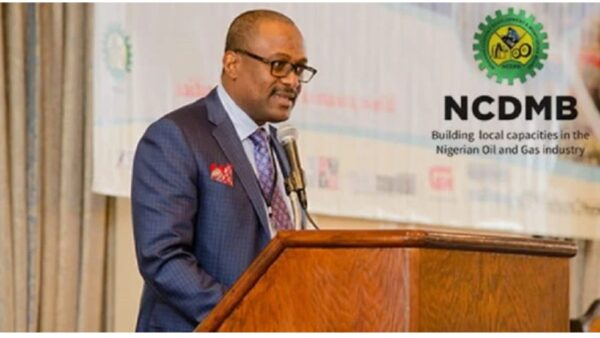NNPCL/Total Energies Joint Venture Achieves Zero Gas Flare

The Nigerian National Petroleum Company Limited/TotalEnergies joint venture has achieved zero routine gas flare in all its assets, NNPCL announced on Thursday.
It said the achievement was in pursuit of meeting the targets of 20 per cent (unconditional) and 47 per cent (conditional) greenhouse gas emission reduction as contained in the Nationally Determined Contribution under the Paris Accord signed by the President Bola Tinubu administration
This feat was announced on Thursday during an inspection tour of OML 100 in South-eastern Niger Delta, off Port Harcourt, by a joint NNPC Ltd and TotalEnergies team to ascertain the success of the OML flare reduction project launched in December 2023,” NNPCL stated in a statement issued in Abuja by its spokesperson, Olufemi Soneye.
It added, “The NNPC Ltd/TotalEnergies joint venture, which is the concession holder of four leases, had hitherto achieved zero routine flaring across OML 99 (2006), OML 102 (2014), and OML 58 (2016), leaving OML 100 as the only lease with routine flaring going on.
“The significance of this achievement is that the last routine flare volume of about 12MMscf/d (12 million standard cubic feet per day) of gas has now been eliminated giving rise to a greenhouse gas emissions reduction of about 341KtCO2e/yr.”
The national oil company said the achievement was an outcome of a programme introduced by the NNPCL to galvanise action towards achieving the zero routine flare by 2030 across its portfolio of assets.
“It is also a testament to NNPC Ltd’s prioritisation of sustainability anchored on the ‘first R’ of its 5R strategy (Reduce, Replace, Renew, Re-plant, Repurpose), as it strives to reduce its carbon footprint.
“Work is ongoing across all other assets within NNPC Ltd’s upstream directorate to ensure that all assets achieve zero routine flaring by 2030 or earlier,” the oil firm stated.
Nigeria’s efforts to reduce gas flaring have recorded progress and challenges. Nigeria, once the second-largest gas flarer globally, has taken several steps to address this issue, with mixed results
In terms of progress, Nigeria reduced gas flaring by around 70 per cent between 2000 and 2018 and has implemented various policy initiatives.
Its National Gas Policy promotes gas sector development and gas utilisation, while the Nigerian Gas Flare Commercialisation Programme, launched in 2016, aims to end routine flaring by 2020, though this is a missed target.
The Flare Gas (Prevention of Waste and Pollution) Regulations, 2018, increased financial penalties for flaring, while the Updated Nationally Determined Contribution committed to a 20 per cent unconditional and 47 per cent conditional reduction in gas flaring by 2030.
However, Nigeria’s ambitious goal of ending routine flaring by 2020 was not achieved, flaring often occurs in remote areas, making gas utilisation projects expensive.
Attracting sufficient investment for gas utilisation projects has remained a challenge, as an unstable domestic gas demand and limited access to electricity hinder gas project viability.
Nigeria acknowledges the need for further action and is revising its gas strategy.
The World Bank and other international organisations are providing support. Achieving zero routine flaring by 2030 remains a significant challenge.
However, gas flaring has severe environmental and economic consequences, and reducing it is crucial for Nigeria’s development. Successful reduction requires collaboration between government, oil companies, investors and communities.
TotalEnergies EP Nigeria Limited says it has finally achieved zero-routine gas flaring in running its operations in Nigeria, while also investing in renewable energy sources to end greenhouse gas emission.
Meanwhile, the Managing Director of the energy firm, Matthieu Bouyer, said TotalEnergies Nigeria achieved what he called routine gas flare-out in collaboration with the Federal Ministry of Environment, the Nigerian Upstream Petroleum Regulatory Commission and the Nigerian National Petroleum Company Limited.
“Routine flare-out is the stoppage of continuous gas flaring above the nominal safety capacity of an oil and gas facility. Today, we are proud to be the first company in Nigeria to have stopped routine flaring from all our facilities. We continue to pioneer in energy as we started to do 100 years ago,” Bouyer stated.
According to him, the achievement important to TotalEnergies and to Nigeria because the company’s objective is to fully stop routine flaring in by 2030.
“On that standpoint, we are in advance in Nigeria since we stopped flaring in 2023. By stopping routine flaring, we are able to valorise the gas, thereby creating value for the country.
“This achievement is one of the practical demonstrations of Total Energies commitment to deliver less carbon-intensive energy to our customers and it also aligns with the Nigerian government’s objective to foster a low carbon economy. In a nutshell, it is more energy for less emissions,” he added.
He said the firm in the past years, had 300 to 350 kSm3/d of routine flaring, he noted has now reduced to zero.
The MD noted that “previously flared gas was valorised and used for power generation, gas lift to enhance oil and gas production, and the balance exported to Bonny to be liquefied in the Nigeria Liquefied Natural Gas.
Speaking about the future, he informed, “All TotalEnergies new projects have a mandatory non routine flaring design. The rule is that any new project should improve the emissions intensity of our operations. For example, our recent projects such as Egina and Ikike were stared-up without flaring”.
He recalled that the firm had signed a Memorandum of Understanding with NNPCL in December 2023 “to support them in their journey to reduce Methane emission with the use of our Airborne Ultra-light Spectrometer for Environmental Application technology”.
To reduce gas and liquid fuels consumption, Bouyer explained that TotalEnergies developed energy efficiency technologies by investing in renewables, saying “we use solar technology onshore with a 5 megawatts solar project at our OML58 field. It will contribute to produce a cleaner oil and gas from the field”.







